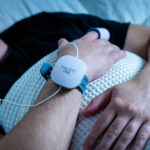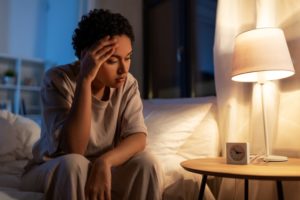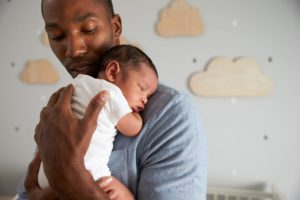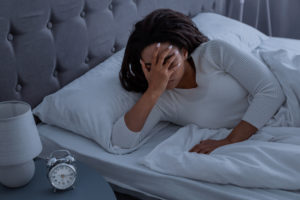When you buy through our links, we may earn a commission. Products or services may be offered by an affiliated entity. Learn more.
Lack of Sleep May Increase Calorie Consumption
Not getting enough rest has a negative impact on your health and physical wellbeing. One outcome of sleep deprivation may be an uptick in the number of calories you consume. Poor diet quality and excessive body weight may also stem from lack of sleep.
The relationship between lack of sleep and eating excessively is likely tied to hormonal functions in the body. Getting a good night’s rest promotes a healthy balance of hormones, including those that regulate appetite, digestion, and metabolism.
Struggling to Stay Awake? Take an At-Home Sleep Test
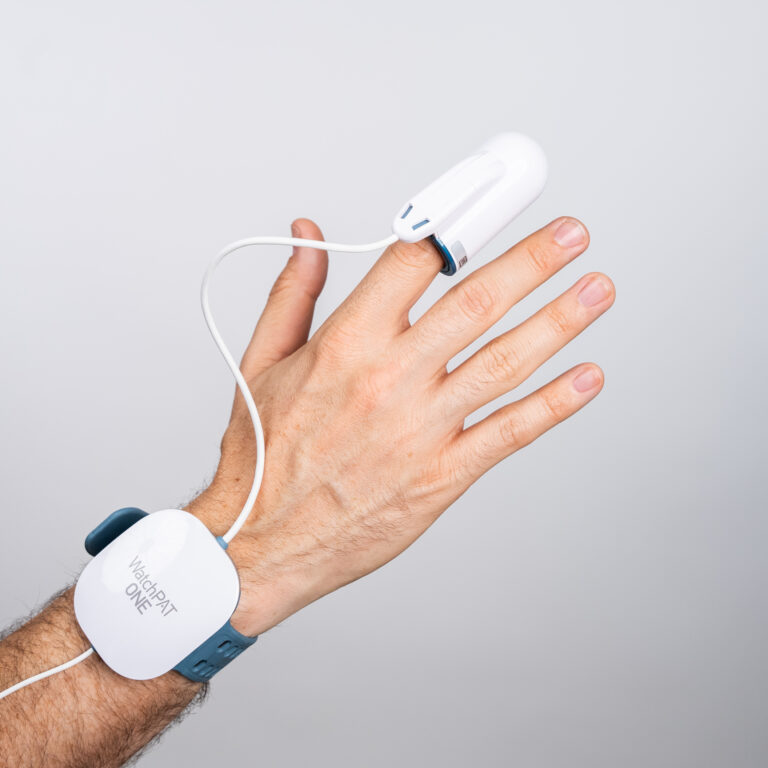
our partner at sleepdoctor.com
10% off Home Sleep Tests
Buy Now“Truly grateful for this home sleep test. Fair pricing and improved my sleep!”
Dawn G. – Verified Tester
How Are Sleep and Appetite Connected?
A good night’s rest promotes healthy production of hormones that control appetite, including leptin and ghrelin. Leptin is a peptide hormone that regulates your body’s energy balance by hindering feelings of hunger and regulating fat storage. Gherin — a hormone secreted in the stomach that acts as a counterpart to leptin — boosts appetite, growth, and fat production.
Sufficient, restful sleep allows the body to regulate production of these two hormones, creating a balance of appetite and satiation. Likewise, lack of sleep can create an imbalance in the body that increases ghrelin levels and lowers leptin levels. This can cause you to feel hungrier during the day. This imbalance caused by sleep deprivation may lead to a higher calorie intake during the day.
Additionally, sleep loss can impact how your body reacts to production of insulin, the hormone that regulates blood sugar levels. This can in turn put you at higher risk for diabetes, a disease that alters the way your body converts food into energy. Obesity is considered a major predictor for diabetes.
Can Lack of Sleep Make You Eat More?
One recent study found that partial sleep deprivation did not significantly affect energy expenditure or resting metabolic rate, or the amount of calories burnedwhen your body is at rest. However, researchers noted that sleep-deprived people tend to consume less fat and protein while their carbohydrate intake remains stagnant.
Although epidemiological studies point to a link between lack of sleep and obesity, as well as a link between short sleep duration and a high body mass index (BMI), researchers have yet to establish how much sleep deprivation impacts appetite and food desire.
In addition to inhibiting healthy production of leptin and ghrelin, lack of sleep can also lead to feelings of fatigue. People who experience fatigue — particularly older adults — are less likely to engage in physical activity. Fatigue may also affect BMI.
While sleep duration has been shown to affect appetite and caloric intake, sleep quality is also crucial. Those who sleep poorly, especially women, are more likely to follow a less healthy diet. This puts them at higher risk of cardiovascular disease and obesity.
Can Lack of Sleep Cause You to Not Eat?
Sleep loss has not conclusively been shown to cause lack of appetite. That said, some medical conditions are often characterized by both fatigue and appetite loss. For example, different types of cancer — as well as certain cancer treatment methods — can cause weight loss when the body does not receive enough nutrients and fatigue brought on by muscle loss.
Other conditions that can cause fatigue and loss of appetite include influenza, food poisoning, hay fever and other allergies, fibromyalgia, and Crohn’s disease. Some women also experience fatigue and appetite loss during their pre-menstrual cycle, though conversely, some will increase their intake of certain foods.
If you’re concurrently experiencing fatigue and loss of appetite, there may be an underlying medical condition causing these symptoms. Talk to your doctor about treatment options, and don’t assume you’re eating less simply because you feel tired.

Still have questions? Ask our community!
Join our Sleep Care Community — a trusted hub of sleep health professionals, product specialists, and people just like you. Whether you need expert sleep advice for your insomnia or you’re searching for the perfect mattress, we’ve got you covered. Get personalized guidance from the experts who know sleep best.
References
17 Sources
-
Prinz P. (2004). Sleep, appetite, and obesity–what is the link?. PLoS medicine, 1(3), e61., Retrieved from
https://pubmed.ncbi.nlm.nih.gov/15599390/ -
Klok, M. D., Jakobsdottir, S., & Drent, M. L. (2006). The role of leptin and ghrelin in the regulation of food intake and body weight in humans: a review. Obesity Reviews, 8(1), 21–34., Retrieved from
https://onlinelibrary.wiley.com/doi/10.1111/j.1467-789X.2006.00270.x -
National Heart, Lung, and Blood Institute. (n.d.). Sleep deprivation and deficiency., Retrieved December 3, 2020, from
https://www.nhlbi.nih.gov/health-topics/sleep-deprivation-and-deficiency -
Chaput JP. (2014) Sleep patterns, diet quality and energy balance. Physiology and Behavior, 134, 86-91., Retrieved from
https://linkinghub.elsevier.com/retrieve/pii/S0031938413002862 -
National Institute of Diabetes and Digestive and Kidney Diseases. (20203 April). What Is Diabetes?, Retrieved December 3, 2020, from
https://www.niddk.nih.gov/health-information/diabetes/overview/what-is-diabetes -
Al Khatib, H., Harding, S., Darzi, J. et al (2017). The effects of partial sleep deprivation on energy balance: a systematic review and meta-analysis. European Journal of Clinical Nutrition 71, 614–624., Retrieved from
https://www.nature.com/articles/ejcn2016201 -
Martin, C. K., et al (2012). Effect of Calorie Restriction on Resting Metabolic Rate and Spontaneous Physical Activity. Obesity, 15, 2964–2973., Retrieved from
http://doi.wiley.com/10.1038/oby.2007.354 -
Greer, S. M., Goldstein, A. N., & Walker, M. P. (2013). The impact of sleep deprivation on food desire in the human brain. Nature communications, 4, 2259., Retrieved from
https://pubmed.ncbi.nlm.nih.gov/23922121/ -
Thorlene Egerton, Sebastien F. M. Chastin, Dorthe Stensvold, Jorunn L. Helbostad (2015). Fatigue May Contribute to Reduced Physical Activity Among Older People: An Observational Study, The Journals of Gerontology: Series A 71(5), 670–676., Retrieved from
https://academic.oup.com/biomedgerontology/article-lookup/doi/10.1093/gerona/glv150 -
Zuraikat, F. M., Makarem, N., Liao, M., St-Onge, M. P., & Aggarwal, B. (2020). Measures of poor sleep quality are associated with higher energy intake and poor diet quality in a diverse sample of women from the Go Red for Women Strategically Focused Research Network. Journal of the American Heart Association, 9(4), e014587., Retrieved from
https://pubmed.ncbi.nlm.nih.gov/32063123/ -
Cancer.net. (2020, April). Appetite Loss., Retrieved December 3, 2020, from
https://www.cancer.net/coping-with-cancer/physical-emotional-and-social-effects-cancer/managing-physical-side-effects/appetite-loss -
Cologne, Germany: Institute for Quality and Efficiency in Health Care. (2013, December 18). Flu: Overview. InformedHealth.Org., Retrieved from
https://www.ncbi.nlm.nih.gov/books/NBK279459/ -
Centers for Disease Control and Prevention, National Center for Emerging and Zoonotic Infectious Diseases (NCEZID), Division of Foodborne, Waterborne, and Environmental Diseases (DFWED). (2020, May 5). Food Poisoning Symptoms. Centers for Disease Control and Prevention., Retrieved December 3, 2020, from
https://www.cdc.gov/food-safety/signs-symptoms/index.html -
American College of Allergy, Asthma & Immunology. (2020, June 17). Allergic Rhinitis., Retrieved December 3, 2020,
https://acaai.org/allergies/types/hay-fever-rhinitis -
United Kingdom National Health Service. (2019, February 20). Fibromyalgia: Causes., Retrieved December 3, 2020,
https://www.nhs.uk/conditions/fibromyalgia/causes/ -
Perler, B. K., Ungaro, R., Baird, G., Mallette, M., Bright, R., Shah, S., Shapiro, J., & Sands, B. E. (2019). Presenting symptoms in inflammatory bowel disease: descriptive analysis of a community-based inception cohort. BMC gastroenterology, 19(1), 47., Retrieved from
https://pubmed.ncbi.nlm.nih.gov/30940072/ -
Reed, S. C., Levin, F. R., & Evans, S. M. (2008). Changes in mood, cognitive performance and appetite in the late luteal and follicular phases of the menstrual cycle in women with and without PMDD (premenstrual dysphoric disorder). Hormones and behavior, 54(1), 185–193., Retrieved from
https://pubmed.ncbi.nlm.nih.gov/18413151/



